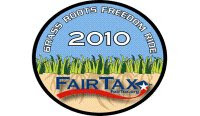30% is a percentage of the net. In other words, the grocer wants to net $1.00 on his loaf of bread. In order to net that amount, he has to add 30% to it. That makes the loaf of bread $1.30. The 23% is a percentage of the gross price - $1.30 - and is included in the price. Take $1.30 X .23 and you get $.30 and the grocer gets his $1.00 net. Your sales receipt will show $1.00 for the loaf of bread and $.30 for the sales tax.
The tax-inclusive gross rate (23%) is no different from the European value-added taxes or the income taxes, payroll taxes and death taxes that the Fair Tax will replace. The 30% tax-exclusive rate is one we already are paying today. By taking home your entire paycheck, including FICA, and removal of tax costs that are embedded in the prices of goods we buy today, purchasing power is maintained.
Here are a few facts:
- The "cost" of products and services upon which the FairTax is calculated will be substantially reduced by the elimination of all the hidden and embedded taxes currently imposed in the IRS-based system, making the total purchase cost (this includes the sales tax) very close to the same as it is today.
- The FairTax makes the cost of all our "government services" visable.
- The FairTax eliminates Congress' ability to distort our economic behavior.
- The FairTax will immediately give the U.S. a balance-of-trade boost by removing the embedded taxes of our exports and taxing imports equally. This is a much better, fairer way to deal with the "China problem".
- The FairTax will truly empower the taxpayer again. Our voices will be heard because we will control the tax revenues through our purchases. Polititions do not want to give up this power.
The FairTax is much better than the 60,000+ pages of regulatory tricks, schemes and charades we call our tax code. Not to mention the $billions of dollars spent in compliance of this code.

No comments:
Post a Comment